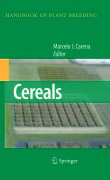
Agriculture depends on improved cultivars, and cultivars are developed through proper plant breeding. Unfortunately, applied plant breeding programs that are focused on cereal commodity crops are under serious erosion because of lackof funding. This loss of public support affects breeding continuity, objectivity, and, perhaps equally important, the training of future plant breeders andthe utilization and improvement of plant genetic resources currently available. Breeding programs should focus not only on short-term research goals but also on long-term genetic improvement of germplasm. The research products of breeding programs are important not only for food security but also for commodity-oriented public and private programs, especially in the fringes of crop production. Breeding strategies used for long-term selection are often neglected but the reality is that long-term research is needed for the success of short-term products. Presents all the major cereal crops from maize to sorghum to riceIncludes discussions of the genetic diversity, breeding methods and techniques, integration of new biotechnologies and seed production in each chapter Of great interest to students and scientists alike A unique, new, and exciting contribution to the field of cereal breeding INDICE: Preface.- Contributors.- Section I Cereal Crop Breeding.- Maize.- Rice.- Spring Wheat.- Rye.- Sorghum.- Durum Wheat.- Barley.- Winter Wheat.- Triticale.- Section II Adding Value to Breeding.- Statistical Analyses of Genotype by Environment Data.- Breeding for Grain Quality Traits.- Breeding for Silage Quality Traits.- Participatory Plant Breeding.- Index.
- ISBN: 978-0-387-72294-8
- Editorial: Springer
- Encuadernacion: Cartoné
- Páginas: 350
- Fecha Publicación: 01/03/2009
- Nº Volúmenes: 1
- Idioma: Inglés
